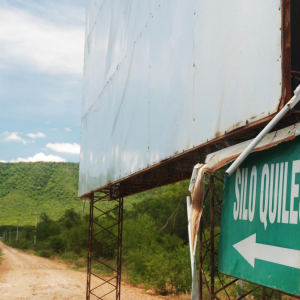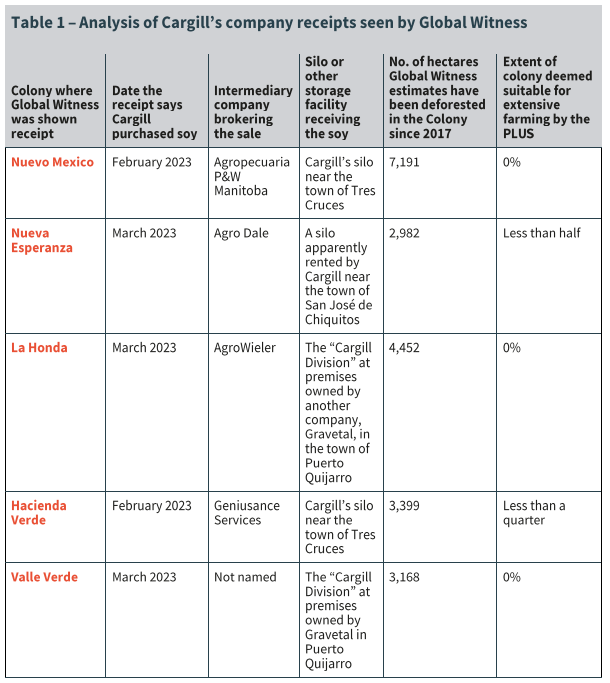
A new report reveals that the food giant Cargill is systematically failing on commitments to a deforestation-free soy supply chain in the near future. Since 2017, Cargill has directly purchased soy from farms that have razed 20,000 hectares of forest in Bolivia. The company's plans for sourcing future soy supplies also put over three million hectares of forest at risk of deforestation.
Summary
Global Witness identified huge areas in Santa Cruz, Bolivia that have been deforested for soy production since 2017. Interviews with farmers and supply-chain actors identified Cargill and its subsidiaries as the common procurement partners in this agricultural expansion. This was proven by receipts from distributors that identify the company as the purchaser. The details of these receipts can be seen in the table below. In contrast to other companies, whose receipt contains details of origin (location, supplier), Cargill only asks for a ‘sender’ which is marked with ‘Santa Cruz’. The report concludes that this is a deliberate attempt to remain ignorant of the deforestation status of their supply chain, which stands in direct opposition to their public commitments. When questioned, Cargill responded that "We constantly monitor our suppliers and can confirm that the Mennonite communities in question are in compliance with our Police on Sustainable Soy."

fig 1. Analysis of Cagrill’s company receipts seen by Global Witness
A leaked map shown to Global Witness also suggests Cargill’s future plans to expand the deforested areas in Santa Cruz. If these plans were to proceed, over 3 million hectares of forest would be cleared, representing a dramatic expansion of Bolivia’s agricultural frontier. This is despite the fact that the company in 2014 signed the New York Declaration on Forests, which aimed to eliminate deforestation from its supply chains by 2020, a date that the company later postponed to 2030. Cargill states, particularly in relation to Bolivia, that it aims to have "the most sustainable food industry supply chains in the world".
Global Witness also emphasises in the report that Cargill’s Bolivian operations are funded by global banks such as Barclays, BNP Paribas, HSBC and Santander, who provide billions of dollars of essential financial services to the company, including underwriting their operations. These deals were made despite the banks’ own deforestation commitments and the countless expositions of Cargills deforestation practises over recent years.
The report concludes with a series of recommendations. Recommendations for Governments include:
- Introduce mandatory environmental and human rights due diligence for the financial sector to prevent lending and investment in companies with insufficient deforestation controls.
- More specifically, this should require banks to identify, report, mitigate and prevent the risk of deforestation and associated activities from their portfolios.
- Legislation and policies aiming to prevent the import of forest risk commodities produced on deforested land
- Ensure that trade negotiations, finance and other policies in Bolivia do not increase pressures on the country’s forests
- Ensure measureable and dated zero-deforestation targets are included in all green finance and real economy regulations.
For Banks and financial institutions:
- Suspend services, financing and contracts with Cargill until the company can demonstrate credible plans to meet deforestation free commitments.
- Review client relationships with Cargill and its subsidiaries as part of this process
For Cargill:
- Honour the New York Declaration on Forests commitments, adopt cut-off dates for soy cultivated on deforested land and set a 2025 deforestation free target.
- Implement full traceability for all soy cultivation, purchasing and processing in Bolivia
- Publish transparent information on Bolivian soy supply chains.
- Commission an independent audit of Cargill’s Bolivian soy purchasing
For the Bolivian government:
- Honour commitment to defend ‘Mother Earth’ by protecting primary forests and implementing sustainable management, including banning their conversion to other land use.
- Regulate soy and other agricultural product sector to ensure full traceability
- Reverse the program of environmental deregulation and prioritise laws and policies to protect the environment.
Find the full list of recommendations here, as well as our own explainer on soy







Post a new comment »